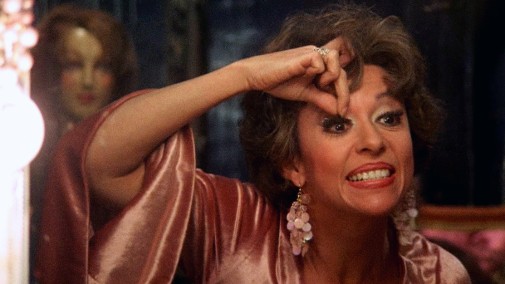
She just turned 90, but Rita Moreno is on the top of her game. The 1961 Best Supporting Actress champion is back on the silver screen thanks to Steven Spielberg's remake of West Side Story. While not playing Anita this time around, Moreno still manages to steal the spotlight and deliver one of the movie's most impactful songs, the emotional high point of the entire production. As pundits argue over the nonagenarian's Oscar chances, it's a good time to look back at her filmography and consider the last time she was in the awards conversation. After the success of West Side Story, Moreno's most acclaimed movie role was probably that of Googie Gomez in the big-screen adaptation of The Ritz…
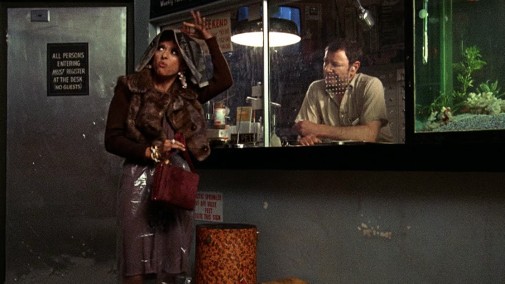
The Ritz starts with a good old-fashioned Italian tragedy. The patriarch of the Vespucci family is dying, putting the rest of the clan in disarray as talks of inheritance fill the air. One thing becomes evident in the middle of the grieving storm: Carmine Vespucci, the mobster son of the dying man, wants his brother-in-law, Gaetano Proclo, out of the picture, either through an annulment or murder. Trying to escape this sorry fate, Gaetano takes refuge in what ends up being a gay bathhouse in Manhattan – the titular Ritz. Through a convoluted mess of schemes and coincidences, the night brings all sorts of kooks to the place. There's a mad chubby chaser running around, a squeaky private eye, Mafiosi, a thirsty F. Murray Abraham, and, of course, the diva Googie Gomez.
While The Ritz started as a play written by Terrence McNally, its demented songstress character is Rita Moreno's creation. Years before she ever crossed paths with the playwright, the actress grew frustrated with the quality of roles Hollywood offered her. To blow out steam and entertain friends suffering through the same systemic racism, Moreno came up with a cartoonish amalgamation of all the Latin stereotypes she was asked to play. Nameless for many years, Googie Gomez was already a satirical figure when McNally wove her into his absurd comedy, adapting some of her characteristics to befit a Bette Midler-type, entertaining the horny gay masses in the sauna. The Ritz proved itself a smashing star vehicle, earning Moreno the T in EGOT.
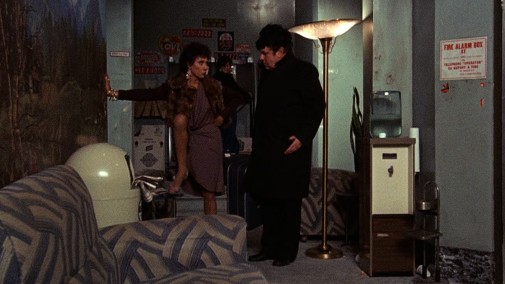
Googie Gomez takes a while to appear on-screen, but all eyes are on her when she does, entering the movie with the energy of a hurricane and the look of a drowning subway rat. Then, out of the rain, she comes, storming into the Ritz with an explosion of Spanish grumblings while trying to balance hat boxes full of wigs, suitcases full of campy costumes. Chewing gum like Rod Steiger hamming his way through In the Heat of the Night, her lips talk miles a minute while her eyes dart around, searching for the big-time producer rumored to be in attendance of her bathhouse concert. As soon as she gets a look at Gaetano, the wheels inside her head start turning.
If he's her man, she's going to make sure to charm him right away, striking a pose that shows off a shapely leg. And he's far from the only man she paws at during the eventful evening. Seeing an All-American hunk with a Mickey Mouse voice, Googie's all grabby hands, and a voracious gaze. He may be unavailable, but she can sure appreciate his beauty. Even more than her behavior, her body language is a constant source of hilarity, every staccato line reading punctuated by a jab, a jutted hip. I didn't know someone could sneer with their whole body until I saw the glory that is Rita Moreno in a skimpy halter dress trying to intimidate some annoying pool boy twink.
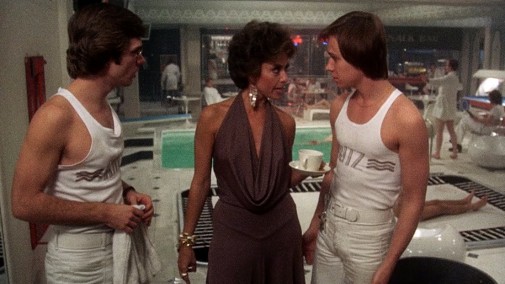
Not all the movie's funny business works equally. The recurring joke of people confusing Googie for a drag queen hasn't aged as well as many of its other larks. Still, Moreno makes it work, primarily by underplaying the woman's reaction within the relative folly of Googie Gomez. She spends most of the story unphased by such comparisons, playing the songstress as a pitchy powerhouse whose self-confidence is too great to be shaken. If anything, Moreno's Googie becomes more excessive with each off-hand joke. It's as if she's daring the audience to laugh at her rather than with her. That's the biggest genius of the performance. Moreno plays an absurd character, but the caricature is on her own and never at her expense.
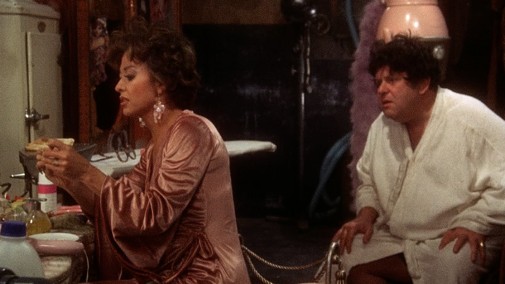
What's more, the broadness of the role doesn't mean this has to be a monotonous or repetitive performance. Recounting a troubled Broadway career, Googie never abandons her farcical register, but Moreno still manages to indicate how some of the professional disappointments in the character's past still hurt. It's in the little flashes of bitterness that overwhelm the punchline, the hardening of her self-reflective look, the wrinkle of fury that palpitates on her forehead. When throwing herself at the supposed producer, Googie acts more angry than sensual. She's fighting for what she deserves, her hunger so bottomless that not even the flirty charade can entirely hide it.
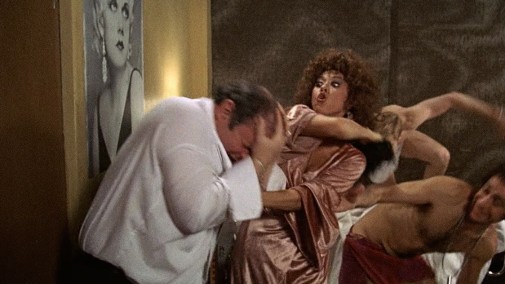
To a certain point, even Googie's more outlandish behaviors seem motivated by canny self-exaggeration. At the very least, Moreno shows how the woman changes moods through sheer force of will and a pragmatic attitude. The moment she discovers neither a famous producer nor an arch-nemesis is in her presence, the fire of her fury dies down in a second, the scene's mood transfigurating immediately. Now that revenge's out the door, survival is more important. And after the danger is unconscious on the floor, she's got her eyes on the prize – the naked hunk standing nearby. Such sharp modulations keep the stagey scenarios from going stale, a danger such a farce could run into on its transition from stage to screen.
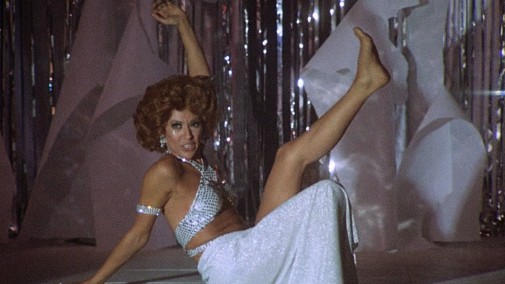
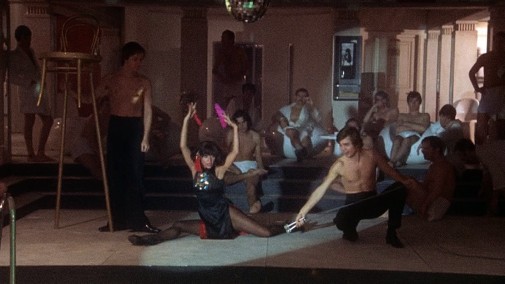
Finally, few things are more gratifying than seeing a master performer play a mediocre one. Moreno's Googie belongs in the pantheon alongside Lesley Ann-Warren's Norma Cassidy and Julianne Moore's Amber Waves. The singing is deliciously off-key, a rollercoaster of musical incompetence, but the dancing's even better. Or is it worse? Whatever the case, she moves like a rusty tin toy, joints stiff, poses crusty. Her split's bad beyond words, worse than Silky in season 11, even worse than Ma'Ma Queen's in Drag Race Holland. In other words, it's a finetuned monument of choreographed awfulness that should have warranted an Honorary Academy Award right there on the spot. It takes talent to play such an enjoyably talentless lunatic.
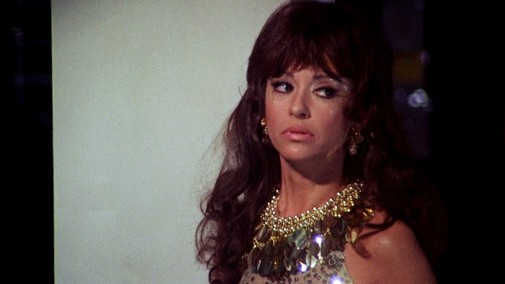
In the 1976-77 awards season, Rita Moreno was nominated by the BAFTAs and Golden Globes. The HFPA was a big fan of The Ritz, further recognized in the Best Actor and Best Picture comedy categories. Despite these precursor honors, Moreno failed to make the Oscar lineup. Instead, the Academy chose Marie-Christine Barrault in Cousin Cousine, Faye Dunaway in Network, Talia Shire in Rocky, Sissy Spacek in Carrie, and Liv Ullmann in Face to Face. From this fascinating lineup – one of only two times when multiple non-English-speaking performances got nominated in Best Actress – Dunaway won, on her third nomination. Like her, Moreno hasn't been nominated since then. However, this year's West Side Story might change that, which would be a historical feat for a myriad of reasons. Are you rooting for her?
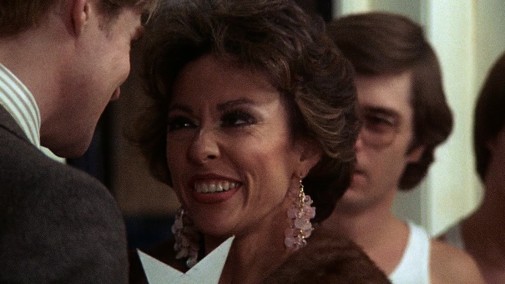
You can rent The Ritz on Apple iTunes, Google Play, and Youtube.